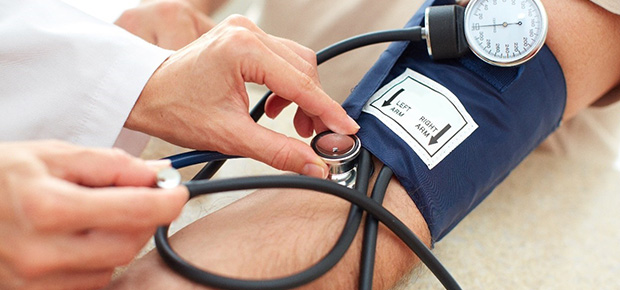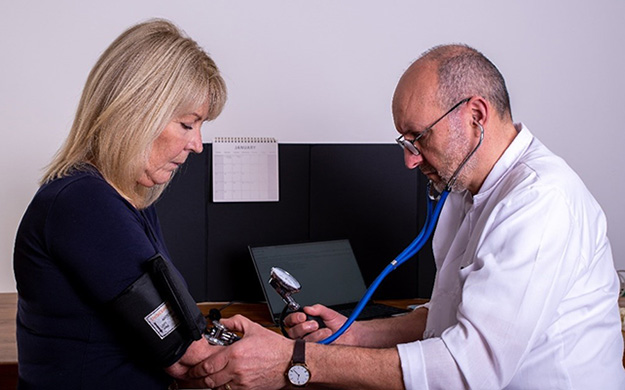Hypertension, also known as high blood pressure, occurs when the pressure of blood flowing through your arteries is excessively high over an extended period. This persistent pressure can eventually cause serious health issues, including cardiovascular diseases and kidney impairment. However, with proper management and care, many people can control their blood pressure and live healthy lives. At Clinical Renal Associates, we help you understand, manage, and treat hypertension – supporting your long-term health and wellbeing.

What Are the Symptoms of Hypertension?
Hypertension is frequently dubbed the “silent killer” due to its lack of obvious symptoms. However, some people may experience:
- Headaches
- Shortness of breath
- Nosebleeds
- Dizziness or blurred vision
- Chest pain
It’s important to note that these symptoms often appear only when blood pressure has reached dangerously high levels.
How Do I Know If I Have High Blood Pressure?
To determine if you have high blood pressure, your healthcare provider will:
- Measure your blood pressure using a blood pressure monitor.
- Review your medical history and risk factors.
- Recommend regular monitoring if your levels are borderline or concerning.
When Do I Need to See a Doctor?
It’s important to consult a healthcare professional if you notice any of the following symptoms:
- Persistent headaches or dizziness
- Unexplained chest pain or shortness of breath
- Blood pressure readings are consistently higher than normal during at-home monitoring or routine check-ups.
What Are the Causes of Hypertension?
Hypertension can be caused by various factors, including:
- Lifestyle Choices: Poor diet, lack of exercise, smoking, and too much alcohol.
- Chronic conditions: Diabetes, kidney disease, or high cholesterol.
- Family history: Genetic factors can significantly influence the likelihood of developing hypertension.
- Age: The likelihood of developing hypertension typically rises as you get older.

What Is Considered High Blood Pressure?
Blood pressure is measured using two numbers:
- Systolic pressure: The upper number, indicating the pressure in your arteries when your heart is contracting and pumping blood.
- Diastolic pressure: The lower number, reflecting the pressure in your arteries when your heart is at rest between beats.
High blood pressure is typically defined as:
- Stage 1: 130-139/80-89 mmHg
- Stage 2: 140/90 mmHg or higher
- Hypertensive crisis: 180/120 mmHg or higher (requires emergency care)
How Common Is High Blood Pressure?
Hypertension is extremely common, affecting millions of people worldwide. In the U.S. alone:
- Approximately one-third of adults experience high blood pressure.
- It is more prevalent among older individuals and those with additional health conditions.
What Are the Types of High Blood Pressure?
There are two primary types of hypertension:
- Primary hypertension: Develops gradually over time, often due to lifestyle factors and aging.
- Secondary hypertension: This form of high blood pressure is caused by an underlying condition, such as kidney disease or hormonal imbalances.
Can I Prevent High Blood Pressure?
Yes, many cases of hypertension can be prevented with healthy lifestyle choices:
- Eat a balanced diet rich in fruits, vegetables, and whole grains.
- Exercise regularly to keep your heart and blood vessels strong.
- Limit salt intake to reduce fluid retention.
- Avoid smoking and excessive alcohol consumption.

What Can I Expect if I Have Hypertension?
If you are diagnosed with hypertension, you can manage it successfully with:
- Medication: Your healthcare provider might prescribe medications to help lower your blood pressure.
- Lifestyle changes: Maintain a heart-healthy diet and exercise routine.
- Regular monitoring: Keep track of your blood pressure and work closely with your healthcare provider.

Should I Check My Blood Pressure at Home?
Yes, checking your blood pressure at home can be a useful method to keep track of your levels between medical visits. You can:
- Purchase a reliable home monitor.
- Check your blood pressure regularly to spot any trends or issues early.
- Report any significant changes to your healthcare provider.
Trusted Blood Pressure Devices for Every Setting
Looking for reliable blood pressure monitors? Visit ValidateBP.org to explore a curated list of devices that have been independently tested and clinically validated for accuracy. Whether you need a monitor for home use, clinical office settings, ambulatory monitoring, or public kiosks—this resource helps you find devices you can trust.
How Long Does High Blood Pressure Last?
Hypertension is typically a long-term condition. However, with the right treatment and lifestyle adjustments, it can be effectively controlled, helping you maintain good health.
When Should I See My Healthcare Provider?
You should schedule regular check-ups if you have:
- A family history of hypertension.
- Other risk factors such as obesity, diabetes, or smoking.
- Frequent blood pressure readings that fall outside the normal range.
When Should I Go to the Emergency Room?
Urgent medical care is required if your blood pressure reaches:
- 180/120 mmHg or higher, along with symptoms such as severe chest pain, shortness of breath, or sudden vision changes.
Can Supplements or Foods Lower Blood Pressure?
Yes, certain foods and supplements can help manage blood pressure naturally:
- Potassium-rich foods: Bananas, spinach, and sweet potatoes.
- Omega-3 fatty acids: Found in fish like salmon or in fish oil supplements.
- Lower your sodium intake: Reducing the amount of sodium in your diet can significantly affect your blood pressure.
We Are Here to Support You
At Clinical Renal Associates, we understand that managing hypertension can feel overwhelming. Our compassionate team is dedicated to providing you with the personalized care you need to effectively control your blood pressure. We’re here to support you throughout your entire journey to improved health. Request an appointment with our top-rated providers today and take the first step toward better health.
